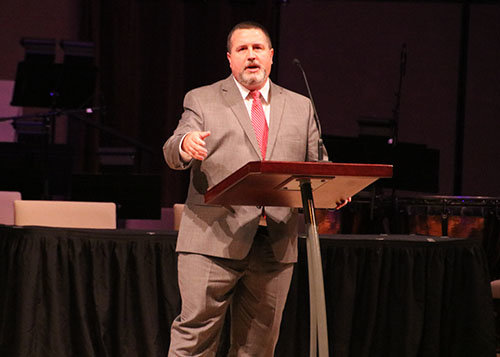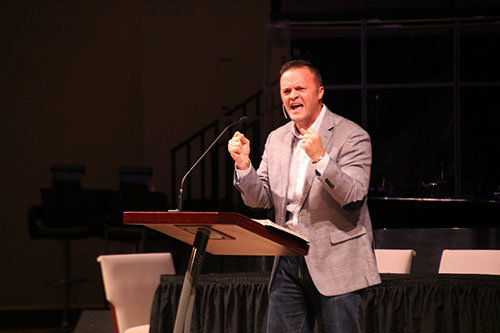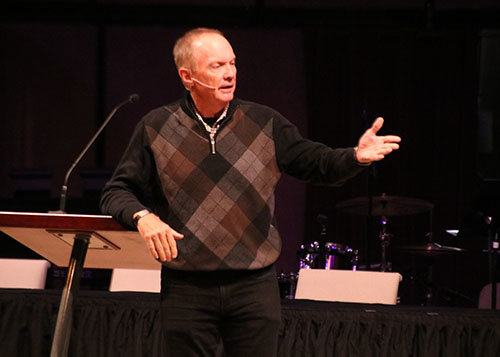WARNER ROBINS — Barry Snapp, president of the GBC preaching conference, welcomed a large number of worshippers to rain-soaked Warner Robins on Monday afternoon and acknowledged that the men he invited to be a part of the conference were men he liked to hear preach.
 Barry Snapp, pastor of Victory Baptist Church in Rockmart, presided over the Preaching Conference at Second Baptist Church in Warner Robins. SCOTT BARKLEY/Index
Barry Snapp, pastor of Victory Baptist Church in Rockmart, presided over the Preaching Conference at Second Baptist Church in Warner Robins. SCOTT BARKLEY/IndexAs it turned out, there were lots of people who appreciate the same preachers Snapp does, because it appeared that the number of people attending the preaching conference rivaled the number of people present for the annual meeting.
And those who exposited the Word of God “preached up a storm.”
The conference was blessed with the Christian music artistry of Rhon Carter, worship pastor at First Baptist Church in Statesboro, and his vocal team. The preaching conference, sponsored by New Orleans Baptist Theological Seminary, was accented by showers of blessings both literally and figuratively.
The first preacher was Jeremy Morton, co-pastor of First Baptist Church in Woodstock. He began his sermon by declaring that each year he chooses a word to guide, inspire, and challenge him during the course of those twelve months. This year his word is “deeper.” He explained, “When your situation is impossible without the Lord – go deeper. There are no limitations for a praying preacher.”
 Jeremy Morton heralds with fervor and passion the absolute priority of prayer at the preaching conference at his home church in Warner Robins. SCOTT BARKLEY/Index
Jeremy Morton heralds with fervor and passion the absolute priority of prayer at the preaching conference at his home church in Warner Robins. SCOTT BARKLEY/IndexMorton’s text was Mark 9:14-29, where we have the narrative of the powerless disciples. A distraught father had taken his troubled, demon-possessed son to the disciples of Jesus in hopes they could help him, but they could not. Yet, Jesus drove the debilitating spirit out of the boy with a word of rebuke.
Afterward, the disciples asked Jesus why they had failed to provide the blessing the boy needed. The Lord responded by telling them that some things cannot be accomplished but by prayer and fasting.
Morton exclaimed, “We cannot help a lick without Jesus. Jesus is the help. Our preaching, our singing, our giving is nothing – Jesus is everything.’
The Woodstock pastor told the story of Toscanini, the famous Italian conductor, who led the Philadelphia Symphony Orchestra in Beethoven’s Ninth Symphony. So majestic was the music that the audience stood to a sustained applause in appreciation for what they had heard. Toscanini took his bows again and again. He turned to the orchestra and they bowed. The audience continued to clap and cheer. Finally, Toscanini turned his back on the audience and speaking only to the orchestra said, “Ladies and gentlemen. I am nothing, you are nothing, Beethoven is everything.”
Having told that story Morton began singing the old hymn, “Brethren we have meet to worship.” With a passionate and pleading voice, the preacher sang, “Brethren, we have met to worship and adore the Lord our God; Will you pray with all your power, while we try to preach the word? All is vain unless the Spirit of the Holy One come down; Brethren, pray, and holy manna will be showered all around.
“Prayer was the driving force in Jesus’ life,” proclaimed Morton. “In worship we can sing too long and preach too long, but we will never pray too long.”
Rick Coram, an evangelist from Jacksonville, Fla. and the second preacher for the conference, preached on the Lord’s letter to the church at Ephesus in Revelation 2:1-7. Ephesus had many good qualities, but they had lost their first love.
Coram asserted, “When people get more excited in the stadium on Saturday than in the sanctuary on Sunday they have lost their first love.”
The evangelist focused on three points: we need revival when the church forgets its priority, when Christians lose their passion, and when Jesus makes a proclamation.
“The reason we are not changing the culture,” Coram stated, “is because the culture is changing us; and that happens because we can get so busy serving the Lord that we forget the Lord we are serving; and without Him we can do nothing.”
James Merritt, senior pastor of Cross Pointe Church in Duluth, preached a stirring message titled, “Can They Hear You Now? Preaching in the 21st Century” based on II Timothy 4:1-5. He opened his message by thundering, “All of us have the ability to preach both powerfully and practically to any culture at any time because we have the greatest subject to preach – the Son of God. We have the greatest source to preach from – the Word of God. We have the greatest strength to preach with – the Spirit of God.
“Any preacher who is a man of God and will take the Word of God and anointed by the Spirit of God … can preach a practical message with powerful results anywhere at any time.”
 James Merritt exhorts pastors to preach the Word “in season and out of season” at the GBC Preaching Conference. SCOTT BARKLEY/Index[/caption]
James Merritt exhorts pastors to preach the Word “in season and out of season” at the GBC Preaching Conference. SCOTT BARKLEY/Index[/caption] Merritt focused on three pieces of advice that the Apostle Paul gave to Timothy. “First, we must remember the charge to be faithful. Paul said, ‘Preach the Word.’ He didn’t charge Timothy to heal the sick, raise the dead, perform miracles; He charged him to preach the Word.
“I want you to understand that I do believe with all of my heart that preaching ought to meet the real needs of hurting people. I want to scratch people where they itch. I want to soothe people where they hurt, but Paul did not advise Timothy to start with the so-called ‘needs’ of people, but to start with the Word of God. May I tell you why? The Gospel is not addressed primarily to felt needs, but to unfelt needs.
“The first eight chapters of the book of Romans tell us that man’s three greatest needs are: (1) to realize he is a lost sinner; (2) repent of his sin; (3) receive by faith Jesus Christ as Lord and Savior. I submit to you those are all unfelt needs.
“We are to preach the Word, because this book is the Word of God without us, but we are nothing without the Word of God.”
Merritt’s second point was “We must realize the choice to be doubtful.” He explained, “We have a choice as to whether or not we are going to preach a God-sized message, but we don’t have a choice on how people are going to receive it. Paul said, ‘For the time will come when they will not endure sound doctrine.’ In other words, Paul very plainly warned us that there will be people who will not want to hear what will make them holy or even spiritually healthy, but only what will make them happy.
“There are a lot of people who do not want to hear sound doctrine. They want their preaching perfumed, chloroformed, and covered with velvet. They want to hear about the love of God, but not the judgment of God, heaven, but not hell.
“There are many people who have the itchy-ear syndrome. They are more concerned about the length of the sermon than they are the depth of the sermon. They are more concerned with the message telling them what God can do for them than they are for what they can do for God. Quite frankly, they will look for preachers and teachers who will tell them what they want to hear, rather than what they need to hear.”
Merritt’s final point was: We must receive the challenge to be watchful. He proclaimed, “In verse 4 of our text Paul urges Timothy to be ‘sober.’ Sober can also be translated ‘watchful.’ One of the things we must do if we are to preach a God-sized message is to make sure that our message is relevant to the world in which we are preaching. Be culturally aware of what is going on. Keep your secular antenna up to the world that is around you, so you can always respond to the culture with biblical truth.”
The preaching conference was challenging and uplifting. Pastor Barry Snapp had obviously prayed for God’s leadership in planning the conference and he presided over the meeting with effectiveness and grace.